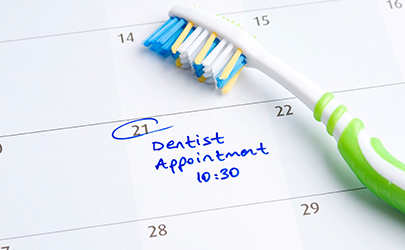Wondering what you should expect from your upcoming oral biopsy, and why you need one? Our Morden dentists explain the biopsy procedure and answer some commonly asked questions about this dental surgery.
What is an oral biopsy?
An oral biopsy is a surgical procedure to take tissue from the patient’s oral cavity to examine, in order for a diagnosis to be made.
Why would an oral biopsy be recommended?
If you have a lesion that interferes with your oral function, you may need a biopsy to determine the cause of the lesion so that proper treatment can be prescribed. There may also be inflammatory changes affecting the oral cavity or bone lesions your dentist is unable to identify using x-rays or clinical examination alone.
A biopsy can also be performed if your dentist suspects you have oral cancer (which is found in the mouth, head and neck). If cancer has already been diagnosed, a biopsy can help determine the stage and extent of the cancer, as well as its source.
Oral and maxillofacial surgeons diagnose and treat a range of illnesses and injuries affecting the neck, jaw, face and mouth. During your appointment, a thorough exam of your head and neck will be done and an oral biopsy performed. We may also refer you to an otolaryngologist (an ear, nose and throat doctor).
During an oral biopsy, a small sample of the suspicious tissue will be removed from your oropharynx or mouth and sent to a pathologist, where it will be checked for disease. A custom treatment plan will then be developed based on information in the pathologist’s report.
Types of Oral Biopsies
Your oral surgeon may perform one of 6 types of oral biopsies:
Aspiration Biopsy
A needle and syringe are used to remove a sample of cells or contents from a lesion. If the oral surgeon is not able to drain fluid or air, it may mean the lesion is solid.
Brush Biopsy
The surgeon applies firm pressure with a circular brush, rotating it to pick up cellular material that will later be transferred to a glass slide, preserved and dried.
Cytology
This type of oral biopsy aids in the diagnosis of lesions in the oral cavity. These lesions may be caused by infections, herpes or post-radiation changes.
Though individual cells can be examined, an accurate and definitive diagnosis may not be possible without an excisional or incisional biopsy also being performed.
Excisional Biopsy
Performed for small oral lesions (typically measuring less than 1 cm) that appear benign during a clinical exam, an excisional biopsy completely removes the lesion.
Incisional Biopsy
Your surgeon will complete this type of biopsy to obtain a representative sample of the oral lesion. If your oral lesion is large or has differing characteristics, more than one area may need to be sampled.
Punch Biopsy
Best suited for diagnosing oral manifestations of ulcerative and mucocutaneous conditions of the oral cavity (such as lichen planus), a punch biopsy is completed using a punch tool.
How should I prepare for my oral biopsy?
You do not need to do much to prepare for a biopsy appointment. If the biopsy will be performed on part of a bone, your dentist will recommend x-rays or CT scans first, and ask that you not eat anything for a few hours before the biopsy.
When you arrive for your biopsy appointment, you’ll typically be asked to rinse with an antibacterial mouthwash. Local anesthesia is usually used and you will likely be awake for the procedure. However, you may be provided general anesthesia if the lesion is in an area of the mouth that’s hard to reach.
Is an oral biopsy painful?
You shouldn’t feel pain during the procedure – perhaps just a sharp pinprick or pinch as the local anesthetic is injected, or as the needle is used to take the biopsy. The use of instruments may also result in some minor pressure as the sample is collected.
After the anesthesia wears off, depending on where the biopsy was performed the site may feel sore for several days. You may want to stick to soft foods and take over-the-counter medication for pain (avoid taking NSAIDs, which can increase the risk for bleeding).
If you find that you are experiencing significant pain from the biopsy, you may be prescribed pain medications.
Do you have questions about your upcoming oral biopsy? Our Morden dentists can address any inquiries or concerns.



